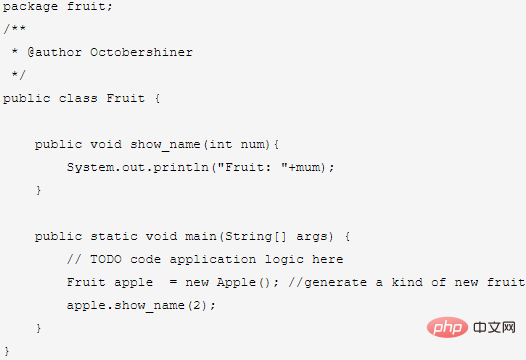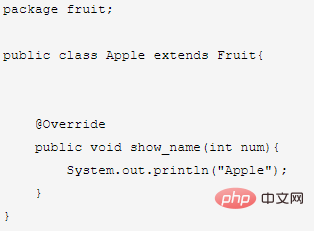What does @Override in java do?

First of all, let’s talk about the general function of @Override:
1. Help yourself to check whether you have correctly overridden the existing methods in the parent class;
2. Tell people who read the code that this is a rewriting method.
Example:
For example, now we have a base class:

(Video tutorial recommendation: java video tutorial)
Now we write an Apple subclass, inherit this base class, and override the show_name() method in the base class.

The result of execution is that the words Apple:2 will be printed.
In fact, when we manually override the method of the parent class, it is easy to remember the parameters of the method incorrectly. If we do not add @Override at this time, the editor will not prompt you: For example, if we do not add this tag, Quietly change the parameter to float type.

At this time, we actually did not successfully override the method according to our intention, so a hidden bug was born. On the contrary, the effect of adding Override is

The IDE gave an error message, indicating that our overwriting method failed.
It is often the result when we prepare to override the method. On the contrary, we overload the method.
Another example: Now we add a private method to the Fruit class, and try to override it in Apple
@Override
private void grow(){
}As a result, the compiler will prompt an error. This is a very low-level error, but there are At this time, we will not find it: that is, we try to override the private method, but when we remove the Override tag, the compiler will not report an error and it can be executed.
In fact, the so-called grow you override in Apple is just a private method for Apple itself. Completely a new approach.
This leads to a question, what is replication?
In object-oriented, only interfaces, shared methods, and inherited methods can be overridden. Private methods cannot be overridden. But after thinking about it again, I realized: it’s not that it cannot be overridden, but that there is no overriding at all. The concept of private methods!
This is the original intention of object-oriented design. The private method itself is to be encapsulated inside the class and not to be changed by others or referenced externally.
Recommended tutorial: java entry program
The above is the detailed content of What does @Override in java do?. For more information, please follow other related articles on the PHP Chinese website!

Hot AI Tools

Undresser.AI Undress
AI-powered app for creating realistic nude photos

AI Clothes Remover
Online AI tool for removing clothes from photos.

Undress AI Tool
Undress images for free

Clothoff.io
AI clothes remover

AI Hentai Generator
Generate AI Hentai for free.

Hot Article

Hot Tools

Notepad++7.3.1
Easy-to-use and free code editor

SublimeText3 Chinese version
Chinese version, very easy to use

Zend Studio 13.0.1
Powerful PHP integrated development environment

Dreamweaver CS6
Visual web development tools

SublimeText3 Mac version
God-level code editing software (SublimeText3)

Hot Topics
 1378
1378
 52
52
 Perfect Number in Java
Aug 30, 2024 pm 04:28 PM
Perfect Number in Java
Aug 30, 2024 pm 04:28 PM
Guide to Perfect Number in Java. Here we discuss the Definition, How to check Perfect number in Java?, examples with code implementation.
 Random Number Generator in Java
Aug 30, 2024 pm 04:27 PM
Random Number Generator in Java
Aug 30, 2024 pm 04:27 PM
Guide to Random Number Generator in Java. Here we discuss Functions in Java with examples and two different Generators with ther examples.
 Weka in Java
Aug 30, 2024 pm 04:28 PM
Weka in Java
Aug 30, 2024 pm 04:28 PM
Guide to Weka in Java. Here we discuss the Introduction, how to use weka java, the type of platform, and advantages with examples.
 Smith Number in Java
Aug 30, 2024 pm 04:28 PM
Smith Number in Java
Aug 30, 2024 pm 04:28 PM
Guide to Smith Number in Java. Here we discuss the Definition, How to check smith number in Java? example with code implementation.
 Java Spring Interview Questions
Aug 30, 2024 pm 04:29 PM
Java Spring Interview Questions
Aug 30, 2024 pm 04:29 PM
In this article, we have kept the most asked Java Spring Interview Questions with their detailed answers. So that you can crack the interview.
 Break or return from Java 8 stream forEach?
Feb 07, 2025 pm 12:09 PM
Break or return from Java 8 stream forEach?
Feb 07, 2025 pm 12:09 PM
Java 8 introduces the Stream API, providing a powerful and expressive way to process data collections. However, a common question when using Stream is: How to break or return from a forEach operation? Traditional loops allow for early interruption or return, but Stream's forEach method does not directly support this method. This article will explain the reasons and explore alternative methods for implementing premature termination in Stream processing systems. Further reading: Java Stream API improvements Understand Stream forEach The forEach method is a terminal operation that performs one operation on each element in the Stream. Its design intention is
 TimeStamp to Date in Java
Aug 30, 2024 pm 04:28 PM
TimeStamp to Date in Java
Aug 30, 2024 pm 04:28 PM
Guide to TimeStamp to Date in Java. Here we also discuss the introduction and how to convert timestamp to date in java along with examples.
 Java Program to Find the Volume of Capsule
Feb 07, 2025 am 11:37 AM
Java Program to Find the Volume of Capsule
Feb 07, 2025 am 11:37 AM
Capsules are three-dimensional geometric figures, composed of a cylinder and a hemisphere at both ends. The volume of the capsule can be calculated by adding the volume of the cylinder and the volume of the hemisphere at both ends. This tutorial will discuss how to calculate the volume of a given capsule in Java using different methods. Capsule volume formula The formula for capsule volume is as follows: Capsule volume = Cylindrical volume Volume Two hemisphere volume in, r: The radius of the hemisphere. h: The height of the cylinder (excluding the hemisphere). Example 1 enter Radius = 5 units Height = 10 units Output Volume = 1570.8 cubic units explain Calculate volume using formula: Volume = π × r2 × h (4




